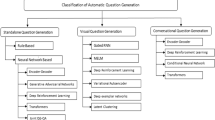Abstract
Dialogue systems are often regarded as being tedious and inflexible. We believe that one reason is rigid and inadaptable system utterances. A good dialogue system should automatically choose a formulation that reflects the user’s expectations. However, current dialogue system development environments only allow the definition of questions with unchangeable formulations. In this paper we present a new approach to the generation of system questions by only defining basic concepts. This is the basis for realising adaptive, user-tailored, and human-like system questions in dialogue systems.
Access this chapter
Tax calculation will be finalised at checkout
Purchases are for personal use only
Preview
Unable to display preview. Download preview PDF.
Similar content being viewed by others
References
Baldridge, J., Kruijff, G.J.M.: Multi-modal combinatory categorial grammar. In: Proceedings of the Tenth Conference on EACL, Stroudsburg, PA, USA, pp. 211–218 (2003)
Berg, M.M.: Survey on Spoken Dialogue Systems: User Expectations Regarding Style and Usability. In: XIV International PhD Workshop, Wisla, Poland (October 2012)
Berg, M.M., Düsterhöft, A., Thalheim, B.: Towards interrogative types in task-oriented dialogue systems. In: Bouma, G., Ittoo, A., Métais, E., Wortmann, H. (eds.) NLDB 2012. LNCS, vol. 7337, pp. 302–307. Springer, Heidelberg (2012)
Boyer, K.E., Piwek, P. (eds.): Proceedings of QG 2010: The Third Workshop on Question Generation, Pittsburgh (2010)
Bringert, B.: Programming language techniques for natural language applications (2008)
Brown, P., Levinson, S.C., Gumperz, J.J.: Politeness: Some Universals in Language Usage. Studies in Interactional Sociolinguistics. Cambridge University Press (1987)
Dautenhahn, K., Woods, S., Kaouri, C., Walters, M.L., Koay, K.L., Werry, I.: What is a robot companion - friend, assistant or butler?, pp. 1488–1493 (2005)
Gupta, S., Walker, M.A., Romano, D.M.: Generating politeness in task based interaction: An evaluation of the effect of linguistic form and culture. In: Proceedings of the Eleventh European Workshop on NLG, Stroudsburg, PA, USA, pp. 57–64 (2007)
Hockenmaier, J., Steedman, M.: CCGbank: User’s Manual. Tech. rep (May 2005)
Hockenmaier, J., Steedman, M.: CCGbank: A Corpus of CCG Derivations and Dependency Structures Extracted from the Penn Treebank. Comput. Linguist. 33(3), 355–396 (2007)
Jokinen, K., McTear, M.F.: Spoken Dialogue Systems. Synthesis Lectures on Human Language Technologies. Morgan & Claypool Publishers (2009)
de Jong, M., Theune, M., Hofs, D.: Politeness and alignment in dialogues with a virtual guide. In: Proceedings of the 7th International Joint Conference on Autonomous Agents and Multiagent Systems, Richland, SC, pp. 207–214 (2008)
Kruijff, G.J.M., White, M.: Specifying Grammars for OpenCCG: A Rough Guide (2005)
Looi, Q.E., See, S.L.: Applying politeness maxims in social robotics polite dialogue. In: Proceedings of the Seventh Annual ACM/IEEE International Conference on Human-Robot Interaction, pp. 189–190. ACM, New York (2012)
Mairesse, F.: Learning to Adapt in Dialogue Systems: Data-driven Models for Personality Recognition and Generation. Ph.D. thesis, University of Sheffield (February 2008)
McTear, M.F., Raman, T.V.: Spoken Dialogue Technology: Towards the Conversational User Interface. Springer (2004)
Olney, A.M., Graesser, A.C., Person, N.K.: Question generation from concept maps. Dialogue and Discourse 3(2), 75–99 (2012)
Ou, S., Orasan, C., Mekhaldi, D., Hasler, L.: Automatic Question Pattern Generation for Ontology-based Question Answering. In: The Florida AI Research Society Conference, pp. 183–188 (2008)
Papasalouros, A.: Automatic generation of multiple-choice questions from domain ontologies. Engineer (Bateman 1997) (2008)
Raskutti, B., Zukerman, I.: Generating queries and replies during information-seeking interactions. Int. J. Hum.-Comput. Stud. 47(6), 689–734 (1997)
Rus, V., Lester, J. (eds.): AIED 2009 Workshops Proceedings: The 2nd Workshop on Question Generation, Brighton (2009)
Steedman, M., Baldridge, J.: Non-Transformational Syntax. In: Combinatory Categorial Grammar, pp. 181–224. Wiley-Blackwell (2011)
Author information
Authors and Affiliations
Editor information
Editors and Affiliations
Rights and permissions
Copyright information
© 2013 Springer-Verlag Berlin Heidelberg
About this paper
Cite this paper
Berg, M.M., Isard, A., Moore, J.D. (2013). An OpenCCG-Based Approach to Question Generation from Concepts. In: Métais, E., Meziane, F., Saraee, M., Sugumaran, V., Vadera, S. (eds) Natural Language Processing and Information Systems. NLDB 2013. Lecture Notes in Computer Science, vol 7934. Springer, Berlin, Heidelberg. https://doi.org/10.1007/978-3-642-38824-8_4
Download citation
DOI: https://doi.org/10.1007/978-3-642-38824-8_4
Publisher Name: Springer, Berlin, Heidelberg
Print ISBN: 978-3-642-38823-1
Online ISBN: 978-3-642-38824-8
eBook Packages: Computer ScienceComputer Science (R0)




